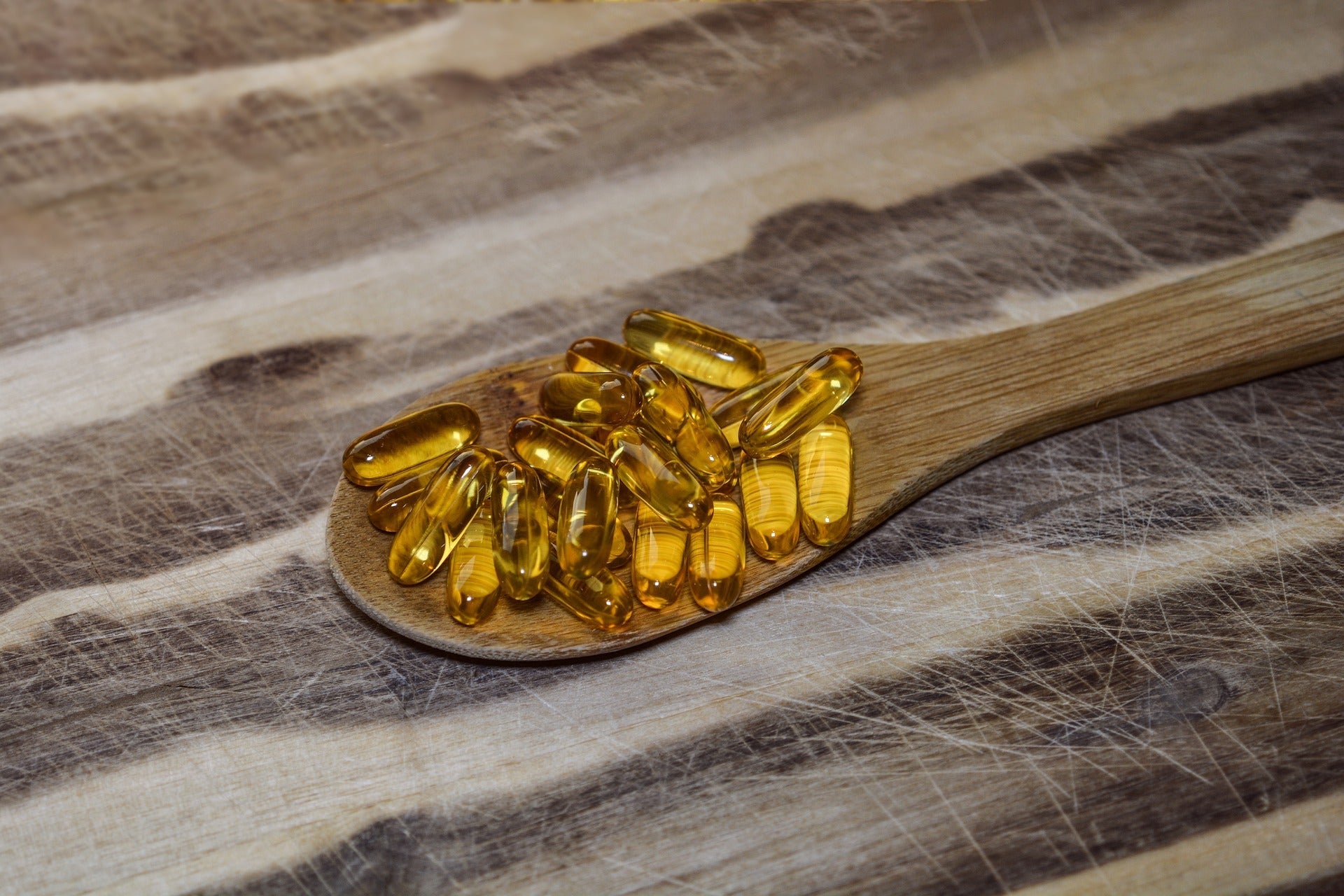
Dr. Eric Venn-Watson’s Highlights
Your yearly blood panel came back, and your doctor isn’t impressed with your numbers. Turns out, you’re one of the 94 million Americans with high cholesterol. Untreated high cholesterol can place you at a higher risk for heart disease and stroke.
Armed with this news and a can-do attitude, you begin a mission to lower your cholesterol without the use of prescription medication (under your doctor’s care, of course). Your doctor recommends eating better, exercising more, and taking fish oil supplements.
Omega-3 seems to get good press for being heart-healthy, so it seems only natural that taking a fish oil supplement would help lower unhealthy cholesterol, right?
Before you buy your first burpless bottle, let’s talk about what science has to say about fish oil, cholesterol, and another fatty acid you may not have heard about. We’ll help you determine whether or not you’re doomed to a life of cod liver and krill supplements or if there’s a better option.
What is Fish Oil?
Fish oil is exactly what it sounds like oil derived from the tissues or livers of fish like salmon, mackerel, sardines, or swordfish.
Fish oil is high in DHA (docosahexaenoic acid) and EPA (eicosapentaenoic acid), which are both types of omega-3 polyunsaturated fatty acids. Omega-3s are abundant in dietary sources, including nuts like walnuts, flaxseed, chia seeds, and vegetable oils. These sources also contain alpha-linolenic acid (ALA), the only essential omega-3 that the body converts to combined EPA and DHA. Essential means our bodies need that nutrient to function, but we can’t make it on our own.
Fish oil supplements contain ALA, DHA, EPA, and often, a lot of less desirable ingredients, toxins, and fillers. Most fish oil supplements are derived from — just as it sounds like — fish, which results in the fishy smell and taste of many of these supplements. Even burpless formulas can’t completely rid you of the fish-like aftertaste. Most people simply grow accustomed to it.
What Else Should You Know About Fish Oil Supplements?
When you pick up a bottle of fish oil capsules at your local store, you trust that the ingredients inside are made to help you, not to harm you. Unfortunately, new research has revealed that we can’t jump to that conclusion.
Because fish oil contains omega-3, it’s subject to peroxidation. In short: it means it can go rancid, just like cooking oil that sits for too long in your pantry. If it’s rancid in the bottle, that means it will be rancid in your body. Several studies have concluded that taking rancid omega-3 can have a negative impact on your lipid profile.
Another consideration is that fish oil supplements aren’t highly regulated. They also have a lengthy supply chain, which means that from fatty fish to bottle, there’s a lot of processing and potential for oxidation. When tested, more than one in 10 fish oil supplements sitting on store shelves were rancid before they were even sold. Rancid omega-3 fatty acid supplementation is about as helpful to your body as eating spoiled food.
How Can You Tell If Fish Oil Capsules Are Rancid?
You might not be able to tell if your fish oil supplements are posing an increased risk to your wellness or helping your body. A hallmark trait of highly oxidized fish oil is a strong fishy odor; however, a strong fishy odor is also common with most fish oil supplements.
The best way to protect yourself and still get health benefits from taking fish oil is by finding a brand that is very transparent and has good reviews. You can also consider contacting the brand for more information about how they source and process their supplements.
If the risk factors seem too risky, there are other ways you can support your body and reduce your risk of developing cardiovascular disease. It starts with a better understanding of what cholesterol is and how it works.
What Is Cholesterol?
Cholesterol is a wax-like substance that is found in your blood. It’s not all bad; your body needs cholesterol to build healthy cells, synthesize hormones, and produce vitamin D. However, too much cholesterol gets sticky, taking up residency on the walls of your arteries and causing damage.
There are two “types” of cholesterol: LDL (low-density lipoprotein-cholesterol) and HDL (high-density lipoprotein). LDL transports cholesterol molecules in your blood to your arterial walls and packs that cholesterol into the arterial tissues. It’s considered “bad” cholesterol because it’s the type that causes clogged arteries, contributes to heart attacks and coronary heart disease, and leads to high triglyceride levels.
HDL cholesterol is considered “good” cholesterol. HDL collects excess cholesterol molecules and carries them to the liver to be metabolized. It’s important to have healthy HDL cholesterol levels to keep unhealthy LDL cholesterol levels lower.
If your blood panel came back showing your total cholesterol was over 240, then you have high cholesterol. A screening that results in a cholesterol reading lower than 200 is considered low cholesterol.
What Are Triglycerides?
When you get your cholesterol screening, you’ll also get a measurement of your triglyceride levels. Triglycerides are the most common type of fat in the body, but they aren’t molecules of cholesterol. Triglycerides can come from foods you eat, but they also occur as a result of excess caloric intake.
When you eat food, your body breaks the macronutrients down for energy. Any excess energy that isn’t immediately needed by the cells is stored in the liver, muscles, and adipose tissue. High levels of triglycerides combined with high LDL cholesterol and low HDL cholesterol are commonly associated with an increased risk of heart attack and stroke.
Lower triglyceride numbers are considered anything below 150 mg/dL. If your healthcare provider is concerned with your numbers, it’s time to consider some ways to lower them. That involves finding out what’s causing high cholesterol and triglycerides.
What Causes High Cholesterol?
There are numerous reasons why you might have high cholesterol, including your genetics. If you exercise and eat a healthy diet, finding out you have unhealthy cholesterol numbers can feel like a kick in the gut.
Other causes of high cholesterol in the general population include:
- Excess weight and obesity. Doctors use your body mass index, or BMI, to determine whether or not your weight is placing you at risk. Having a BMI measurement over 30 is considered obese and increases your risk of numerous diseases like type 2 diabetes, hypertension, and heart disease.
- Inactivity and sedentary lifestyle. Many people confuse daily movement around the home with physical activity. While it's true that doing the dishes, making your bed, and walking to the mailbox keep you off the couch, they don’t account for the type of physical activity required to reduce your cholesterol levels.
- Poor diet. The standard American diet is made up of highly processed convenience foods, fast foods, added sugar, and trans fats. This diet is usually void of fruits and vegetables and doesn’t contain the nutrients the body needs to thrive.
- Certain medications. A medication you take may be causing higher than normal cholesterol. Some birth control medications, beta-blockers, and some antivirals may cause your cholesterol to elevate.
- Chronic illnesses. Type 2 diabetes and hypertension can both cause cholesterol levels to become higher.
- Genetic factors. You might not know it, but your high cholesterol could be genetic. If you have a parent who has high cholesterol, there’s a higher chance you could develop high cholesterol too.
In addition to improving your diet and exercising more, your doctor may also suggest taking a supplement like omega-3s or another prescribed medication (like statin) to improve your heart health.
Here’s what you should know about fish oil and how it affects cholesterol.
Fish Oil and Your Cholesterol
It seems like a sure bet; fish oil helps support heart health, so it makes sense it would lower your cholesterol, too. Unfortunately, the claims may not be as science-backed as they’re advertised to be.
Fish oil has been studied extensively in relation to cholesterol numbers. In over 21 studies of healthy men and women, fish oil supplements (high doses of omega-3) were actually shown to increase bad LDL cholesterol. For someone with an already unhealthy LDL or total cholesterol screening, this could increase their risk of developing heart disease.
DHA has been shown to increase LDL, while pure EPA has been shown to have no effect on LDL. Further, Omega-3s are FDA-approved for treating triglyceridemia and not hypercholesterolemia. Not to mention, omega-3s increase one’s risk of bleeding and are not recommended prior to elective surgery.
There’s slightly conflicting evidence in new research, though. Fish oil does have an impact on cholesterol, and it isn’t simply an increase in LDL cholesterol. Studies of fish oil supplement use also reveal that fish oil helps increase your good HDL cholesterol levels. The same studies also reported that fish oil helped increase the molecule size of LDL cholesterol.
The increase in LDL cholesterol molecules makes them less likely to cling to artery walls, which can decrease your chances of developing atherosclerosis.
Bottom line: Should You Take Fish Oil to Lower Your Cholesterol?
Probably not. If you have high cholesterol numbers, there is good evidence to show that taking fish oil won’t help you regain your cholesterol balance. In fact, it could place you at a higher risk of developing even higher LDL levels. Coupled with the information we now have about fish oil capsules and their rancidity, we can look for a better option.
If, however, you do not have high cholesterol, taking fish oil is unlikely to raise your cholesterol levels so significantly that it makes you unhealthy. Ultimately, getting a yearly blood screening will ensure your cholesterol levels are still within a healthy range while you take a supplement.
How To Lower Cholesterol
If fish oil is off the table because of purity concerns, their unpleasant taste, stomach distress, diarrhea, heartburn, risks of bleeding, or something else, what other remedies are you left with to decrease your cholesterol levels if you’ve been told you don’t have to take prescription medication? Here, we give you three suggestions that could help you lower your cholesterol naturally.
1. A Healthy Diet
You likely know you’ve got to make some dietary changes if you’re going to change your cholesterol numbers, but the “low-fat” diet may not be the solution. In fact, since America went low fat in the late 1970s, we’ve seen a massive increase in the occurrence of metabolic diseases like:
- Diabetes
- High blood pressure
- High cholesterol
- Obesity
A better diet starts with more fruits and vegetables and smarter choices in terms of protein, fat sources, and carbohydrates.
Starting a new diet plan can seem challenging, but making small changes helps keep it manageable. One of the easiest ways to encourage a healthier diet is to shop for and consume more whole foods. What’s a whole food? A whole food is a food that is as close to its original state as possible, like a banana or fresh spinach.
Another easy change is to increase your daily vegetable intake. Aim for between four and five servings of vegetables per day to support your overall health, increase your heart-healthy fiber intake, and get the nutrients your body needs to thrive.
(We’ve got plenty of information available on our blog to help you clean up your diet and make better choices!)
2. Get Moving
You won’t be able to fix your unhealthy cholesterol with diet alone. If you lead a sedentary lifestyle, you’ll have to get moving.
A healthy activity level consists of at least 150-225 minutes of heart-pumping cardiovascular activity per week (about a half-hour most days per week), accompanied by strength training several times per week.
While you get physically active and build muscle, you’ll also burn more calories and likely lose weight; a convenient side-effect you can be happy about if you need to shed some pounds.
Resistance training, in particular, is important to help support your heart health. This meta-analysis concluded that continual resistance training (like the kind you get by lifting weights) decreased LDL cholesterol and increased HDL cholesterol.
3. Try a Different Fatty Acid
The omega fatty acids were discovered in 1929 by Mildred and George Burr, a husband and wife team. Fast forward 90 years and another husband and wife doctor/scientist team discovered a new essential fatty acid. It's called pentadecanoic acid, or C15:0 for short.
C15:0 is an odd-chain saturated fatty acid that a growing body of evidence supports as an essential fatty acid that strengthens our cells and helps us live healthier, longer lives.*
Elevate your cells. Elevate your self.
Pentadecanoic Acid: How It Works
In the late 1970s, dietary guidelines were issued to the entire population in response to the epidemic of heart disease. The message? Eat less fat. We listened, and four decades later, heart disease is still the number one killer of Americans.
Turns out, not all fat is bad for us, and by reducing all types of fat in our diet, we created a nutritional deficiency that left us sick, tired, and less healthy.
C15:0 is found mostly in whole-fat dairy products, which is why many of us don’t have enough of it in our diets. The problem is we ideally want to get healthy saturated fats without the bad ones.
C15:0 helps keep our cells healthy by:
- Supporting cell membranes. This sturdy fatty acid gets into the cellular membrane and strengthens it, keeping it safe from external stressors.
- Increasing mitochondrial function. C15:0 has been shown to increase the energy source in our cells (their mitochondria) by 45%. When our cells have more energy, they can perform more cellular functions.
C15:0 also helps your mitochondria generate more ATP, the energy currency your cells require. In one study, C15:0 increased AtP by 350%. At the same time, C15:0 helps repair the pathways in the cells that generate energy, so your cells can continue functioning properly.
C15:0 also helps reduce proinflammatory cytokine levels. These molecules are some of the key drivers in cellular aging. By activating AMPK, C15:0 also restores balance to many of your body’s homeostatic functions, like glucose uptake and immunity.
C15:0 also works to balance metabolism, immunity, mood, sleep, and even appetite. By activating special receptors in the body called PPARs that control these functions, C15:0 helps us to maintain homeostasis.
Bringing C15:0 back into our diet can help us lead healthier, more balanced lives, but we may want to get just the good C15:0 fat without cows and calories. Thankfully, there’s a solution.
Fatty15 for Healthy Cholesterol
Fish oil is fishy. Fatty15 is pure, vegan-friendly, and contains just one simple ingredient: FA15™.
This easy-to-take, science-backed essential fatty acid is easy to take and won’t ever leave you with an undesirable aftertaste.
Fatty15 helps you get the good fat back in your diet, so you can take care of your cells and support a healthy—well, everything. By putting this cell-nourishing fatty acid back in your body, you give your cells a fighting chance against the biggest factors that make us age.
You’ve already got the willpower to make changes, grab the science-backed, award-winning, patented fatty acid supplement that helps you feel healthier and age smarter.* Your body (and your tastebuds) will thank you.
Sources:
High cholesterol - Symptoms and causes - Mayo Clinic
Overview of Omega-3 Fatty Acid Therapies|NCBI
High Cholesterol Facts | cdc.gov
Revealed: many common omega-3 fish oil supplements are ‘rancid’|The Guardian
HDL (Good), LDL (Bad) Cholesterol and Triglycerides | American Heart Association

Eric Venn-Watson M.D.
CEO, Co-Founder
Senior Scientist, Co-Founder
Eric is a physician, U.S. Navy veteran, and Co-founder and COO of Seraphina Therapeutics. Eric served over 25 years as a Navy and Marine Corps physician, working with the special forces community to improve their health and fitness. Seraphina Therapeutics is a health and wellness company dedicated to advancing global health through the discovery of essential fatty acids and micronutrient therapeutics.
You May Also Like...
The Definitive Guide to Aging's Role in Human Longevity
Aging is a complex biological process impacting health and longevity, requiring a distinction between chronological age, biological age, and psychological age to understand its nuances
7 Proven Ingredients That Boost Anti‑Aging Benefits Naturally
The quest for healthy aging has evolved into evidence-based science, identifying specific nutrients that support cellular health and longevity.


